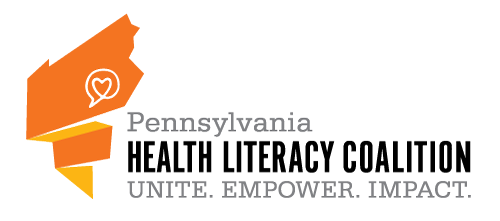The events of the past year have highlighted the inequities that many Americans face, in both health and civil rights. In response, organizations and individuals across the country are looking to uproot the deeply entrenched racism that has given rise to such inequities, using the current momentum to drive towards significant, sustainable change. Multiple public health organizations, including the American Public Health Association, American Medical Association, and the Centers for Disease Control and Prevention, have officially named racism as a public health crisis. At the heart of these statements is the understanding that racism at various levels pose serious barriers to equity in health and wellness.
The Pennsylvania Health Literacy Coalition (PAHLC), recognizing the important role that health literacy can play in fighting racism and promoting health equity, has recently made an explicit commitment to advancing health equity as part of its core activities. Each of the organizations with a key role in the PAHLC – Health Care Improvement Foundation, Health Care Council of Western Pennsylvania, and the Pennsylvania Department of Health (PA DOH; PAHLC funder)–have each focused on centering anti-racism and health equity in their work in a variety of ways:
Health Care Improvement Foundation’s Organizational Response
In the aftermath of George Floyd’s killing in May 2020, the Health Care Improvement Foundation (HCIF) formed an employee-led Anti-Racism Council (ARC). The ARC developed a roadmap for HCIF to address multiple layers where racism or bias may be embedded: interpersonal, organizational, and external. The ARC began by holding educational all-staff workshops to explore systemic racism, personal privilege, and implicit bias, and how those impact public health. As part of a shift to an explicit focus on embedding health equity into HCIF programming, the ARC held an all-staff workshop earlier this month to explore ways to incorporate racial equity principles and methods into existing HCIF projects. ARC recently completed an assessment of organizational practices and culture, with the aim of identifying areas for improvement and ultimately developing a racial equity plan in the next several months to address those gaps.
Health Equity at Healthcare Council of Western Pennsylvania
Since 2015, Healthcare Council of Western Pennsylvania has worked hand in hand with HCIF on health literacy work across the Commonwealth, working with their member organizations to implement best practices in health literacy. Notable activities include the rolling out of a train-the-trainer model on health insurance literacy in 2018 and 2019 and a current initiative focused on COVID-19 health literacy education targeting immigrant and refugee populations in Allegheny County.
Health equity has always been a focus at Healthcare Council of Western Pennsylvania, but during the COVID-19 global pandemic, needs of their member organizations and the communities they serve have only increased. In response, over the past year, Healthcare Council has begun approaching health equity from a social determinants of health lens. In July 2020, Healthcare Council started working with its ten faith-based long-term care member organizations on the Crisis Employee Support Program (CRESP). This specific initiative focuses on three areas of assistance: work/life, emotional/mental health, and financial education. Through this program, over 11,000 boxes of food, financial education classes, and mental health surveys have been provided to frontline healthcare workers. With funding from a local foundation, Healthcare Council is implementing a Community Health Worker model in two Allegheny County communities to address social needs such as food insecurity, housing/utility problems, and lack of healthcare. Through these types of programs, Healthcare Council is committed to addressing health equity in varied ways to support their member organizations and the communities they serve in western Pennsylvania.
Pennsylvania Department of Health’s Office of Health Equity’s Approach
Pennsylvania Department of Health’s Office of Health Equity (OHE) is working to address health disparities at both the individual and systems level in a number of ways.
- The COVID-19 Health Equity Response Team is among the Office’s collaboratively-led efforts to address pandemic-related disparities. This diverse task force is made up of over 300 community, government, faith-based, and academic stakeholders who, in the summer of 2020, developed 69 recommendations to mitigate the negative impact of COVID-19 for roughly 15 vulnerable populations in the Commonwealth.
- At the beginning of 2021, OHE set out to embed equity into their administrative practices by including Culturally Linguistically Appropriate Services (CLAS) and Health Equity language in all Commonwealth documents and contracts with vendors. This contract language aims to utilize the National CLAS Standards in order to provide equitable services to communities, identify specific group(s) or population segments experiencing disproportionate burden, and address specific social determinants of health that affect high risk populations.
- The Pennsylvania Interagency Health Equity Team (PIHET) meets monthly to discuss health equity concerns with other state agencies. PIHET recently convened an Anti-Racism Institute, which convenes stakeholders across multiple systems in Pennsylvania to expand their knowledge on health inequities in Pennsylvania communities, explore how systemic and institutionalized racism has contributed to existing policies and practices that negatively impact health, and identify ways to initiate change within their role(s) and agencies.
HCIF, Healthcare Council, and PA DOH demonstrate different ways of meeting the moment to make health equity a reality in the Commonwealth. PAHLC will draw on these commitments to strengthen its efforts to build a culture of health literacy in Pennsylvania that is grounded in equity. We encourage our Coalition members to review the 10 Attributes of a Health Literate Organization and PA OHE’s CLAS Toolkit, which is designed to enable individuals and organizations to implement the National CLAS Standards within their programs and initiatives as a great first step to identifying areas of improvement and helping your organization meet the moment as well.
This blog post was written by Cassidy Tarullo, MPP, Administrative Coordinator, Health Care Improvement Foundation, Hillary Holes, CHES, Director Health Equity, Healthcare Council of Western Pennsylvania, Judelissa Rosario, MS, Public Health Program Administrator, Pennsylvania Department of Health , and Emily McKittrick, Office of Health Equity Intern.
